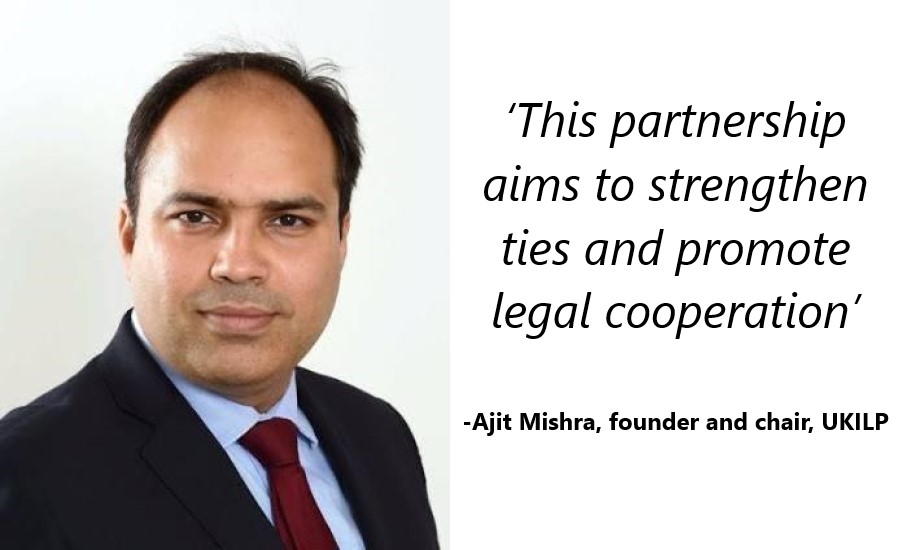
Ajit Mishra is the founder and chair of the UK-India Legal Partnership (UKILP), which aims to bring about networking and closer ties between lawyers in the two countries. He explains his reasons behind setting up the UKILP, talks about why most UK law firms prefer to run their India desks from Singapore and Dubai instead of opening offices in India, and the industry view from within the country about the liberalisation of the legal market.
ALB: What was the rationale behind setting up the UK-India Legal Partnership, and what are its objectives and goals in the coming years?
MISHRA: We identified a significant opportunity between India and the UK, where there are too many government and private organisations focusing on business and trade relations between the two countries, but there’s an absolute absence of a network or organisation with focus on lawyers between the two countries. UKILP bridged this gap. This partnership aims to strengthen ties, promote legal cooperation, recognise outstanding lawyers and law firms, and facilitate knowledge exchange between legal professionals in both countries. Moving forward, the UKILP aims to deepen cooperation and expand its network to cities like Manchester, Birmingham, Bristol, Leeds and Edinburgh in the UK, and Bangalore, Hyderabad, and Chennai in India. We are also in the process of developing a networking and educational portal for young lawyers.
ALB: What needs to be done to improve the legal business ties between the UK and India, both from a business and a regulatory perspective?
MISHRA: This slow growth can be attributed primarily to the barriers to entry for British law firms into the Indian market and the uncertainty surrounding time-scale and formats for market liberalisation. This uncertainty has led many foreign law firms’ India desks to relocate to Singapore and Dubai. Similarly, we need to promote Indian law firms to set up international offices.
Regulatory harmonisation efforts should be pursued to align legal frameworks and facilitate smoother cross-border operations. This includes streamlining visa processes for legal professionals, mutual recognition of qualifications, and establishing clearer guidelines for foreign law firms operating in each other’s jurisdictions.
ALB: What are stakeholders’ concerns while considering the launch of an India office, and how can these be addressed?
MISHRA: The recent announcement by the Bar Council of India (BCI) regarding the opening of the Indian legal market to foreign law firms, following a UK-India trade deal, has been met with enthusiasm in the UK and international legal communities. However, the lack of clear regulations and a recent petition challenging the BCI regulations at the Delhi High Court have created uncertainty for stakeholders. Establishing an office in India, or for that, in any foreign country, is a significant commitment, and such uncertainties discourage long-term commitments within the international legal market. A major concern among stakeholders is the regulatory landscape and compliance requirements in India. Clarity on regulatory frameworks, licensing procedures, taxation and compliance standards is crucial to facilitate informed decision-making and ensure a smooth entry into the Indian market.
Addressing these concerns by providing clear guidelines and support on regulatory compliance would instil confidence among law firms considering venturing into India. Enhancing regulatory clarity can attract greater interest and investment from international legal practitioners, contributing to the growth and development of India’s legal sector.
ALB: How have stakeholders in India’s legal industry responded to the liberalisation of the market in the country?
MISHRA: We recently convened two roundtable discussions for the City of London Corporation in Delhi and Mum-bai. The objective was to assess the prevailing sentiments in India’s legal landscape and solicit input from participants.
Overall, our findings indicate a palpable eagerness within the legal community, comprising both lawyers and general counsel, for the Indian legal market to open but in phased manner.
Mid-tier law firms, in particular, view this development as an opportunity to cultivate close or best-friend relationships with international law firms. This strategic approach enables them to capitalise on potential collaborations, thereby bolstering their global presence. I anticipate a potential reversal in the brain-drain phenomenon, wherein Indian lawyers working with international law firms may opt to return to India, further enriching the legal landscape.


